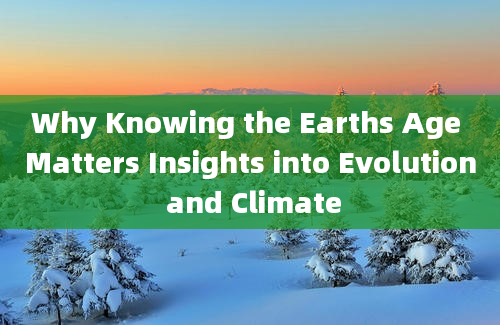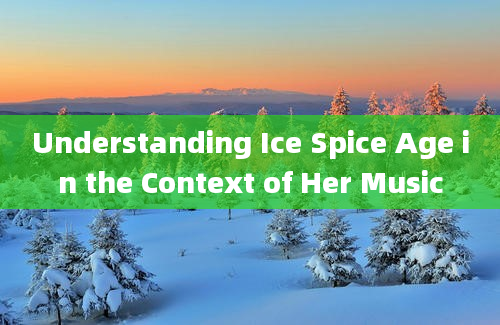Why Knowing the Earth's Age Matters: Insights into Evolution and Climate

Understanding the age of the Earth is a fundamental aspect of various scientific disciplines, including geology, biology, and climatology. The Earth's age, estimated to be approximately 4.54 billion years, provides crucial insights into the processes of evolution and climate change. This article delves into why knowing the Earth's age matters, supported by authoritative sources.
The Significance of Earth's Age in Evolution
The concept of deep time, or the vast expanse of geological time, is essential for understanding the process of evolution. Charles Darwin's theory of natural selection, as outlined in his seminal work "On the Origin of Species" (1859), relies heavily on the idea that life has evolved over millions of years. The age of the Earth provides the necessary temporal framework for this process.
According to the University of California Museum of Paleontology (UCMP), the fossil record, which spans billions of years, offers direct evidence of evolutionary change. The gradual accumulation of small genetic variations over long periods has led to the diversity of life we see today. For instance, the transition from fish to amphibians, as evidenced by fossils like Tiktaalik, took place over millions of years.
Source: [University of California Museum of Paleontology](https://www.ucmp.berkeley.edu/history/evolution.html)
The Role of Earth's Age in Understanding Climate Change
The Earth's age also plays a critical role in understanding climate change. By studying geological records, scientists can reconstruct past climates and identify patterns and trends. The Intergovernmental Panel on Climate Change (IPCC) emphasizes the importance of paleoclimate data in understanding current climate dynamics.
For example, ice cores from Antarctica and Greenland provide a detailed record of past atmospheric compositions and temperatures over hundreds of thousands of years. These records show that the Earth has undergone cycles of glaciation and interglacial periods, driven by factors such as variations in solar radiation and greenhouse gas concentrations.
Source: [Intergovernmental Panel on Climate Change](https://www.ipcc.ch/report/ar5/wg1/)
Radiometric Dating: The Key to Determining Earth's Age
Radiometric dating techniques, such as uraniumlead dating, have been instrumental in determining the Earth's age. The U.S. Geological Survey (USGS) explains that these methods rely on the decay of radioactive isotopes in minerals to calculate the age of rocks. The oldest known rocks on Earth, found in the Canadian Shield, are approximately 4.03 billion years old, providing a minimum age for the Earth.
Source: [U.S. Geological Survey](https://www.usgs.gov/faqs/howoldisearthandhowdoscientistsknow)
Frequently Asked Questions
1. Why is knowing the Earth's age important for understanding evolution?
Knowing the Earth's age is crucial for understanding evolution because it provides the temporal framework needed for the gradual process of natural selection and genetic variation to occur over millions of years.
2. How does the Earth's age help in studying climate change?
The Earth's age allows scientists to study geological records, such as ice cores and sediment layers, to reconstruct past climates and identify longterm climate patterns and trends.
3. What is radiometric dating, and how does it help determine the Earth's age?
Radiometric dating is a technique that measures the decay of radioactive isotopes in minerals to calculate the age of rocks. It has been essential in determining the Earth's age by dating ancient rocks.
4. Can the fossil record provide evidence of the Earth's age?
While the fossil record itself does not directly determine the Earth's age, it provides evidence of the sequence of life forms over millions of years, supporting the concept of deep time.
5. How do ice cores contribute to our understanding of Earth's age and climate?
Ice cores contain layers that record past atmospheric compositions and temperatures, offering insights into climate changes over hundreds of thousands of years.
6. What is the significance of the oldest known rocks in understanding the Earth's age?
The oldest known rocks, approximately 4.03 billion years old, provide a minimum age for the Earth and support the estimate of 4.54 billion years based on radiometric dating.
7. How does the concept of deep time relate to evolution?
Deep time refers to the vast expanse of geological time, which is essential for the gradual process of evolution to produce the diversity of life observed today.
8. Why is the age of the Earth important for biological research?
The age of the Earth is important for biological research as it provides a context for understanding the timescales over which biological processes, such as evolution and extinction, occur.
9. How do scientists use geological records to study past climates?
Scientists use geological records, such as sediment layers, fossil pollen, and ice cores, to reconstruct past climates by analyzing the physical and chemical properties of these materials.
10. What role does the Earth's age play in the study of natural selection?
The Earth's age is fundamental to the study of natural selection because it allows for the long periods required for genetic variations to accumulate and lead to the evolution of new species.
By understanding the Earth's age, scientists gain valuable insights into the processes that have shaped our planet and its inhabitants over billions of years. This knowledge is crucial for advancing our understanding of evolution and climate change, ultimately informing our approach to environmental stewardship and conservation.










